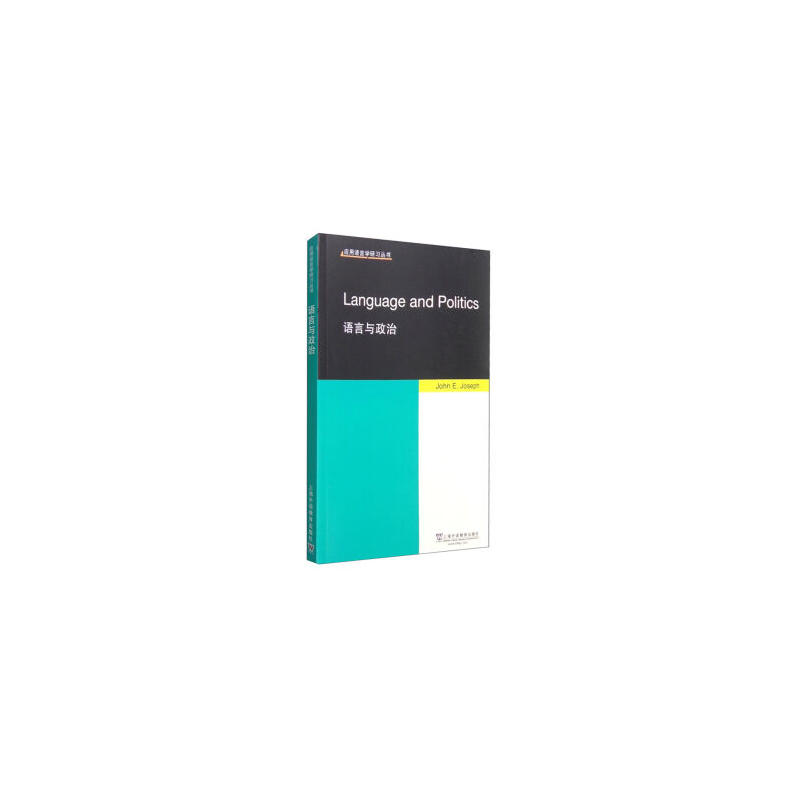暂无评论
图文详情
- ISBN:9787544642941
- 装帧:一般胶版纸
- 册数:暂无
- 重量:暂无
- 开本:32开
- 页数:170
- 出版时间:2016-07-01
- 条形码:9787544642941 ; 978-7-5446-4294-1
本书特色
本丛书的各分册主题均为近年来应用语言学研究领域的热点话题,其中既有对所论述主题的理论回顾和梳理,也有对较新的发展和应用所做的阐释和分析,脉络清晰,语言简洁,共同反映了这一领域过去三四十年间的成果和积淀。
内容简介
对于中国这样一个英语教学大国,和语言教学相关的话题一直受到语言学界的关注。应用语言学作为一个涵盖范围十分宽广的研究领域,尤其受到我国学者及语言学方向师生的重视。本世纪初,外教社陆续引进出版了“牛津应用语言学丛书”、“剑桥应用语言学丛书”等国际优秀学术成果,因其内容权威、选择精当而受到外语界的好评。 近年来,应用语言学研究取得了很多新的进展,如何引导我国语言学方向的研究生快速便捷地了解这一领域的发展全貌和研究热点,成为我国语言学界老师面临的一个重要问题。有鉴于此,我们又从爱丁堡大学出版社、Multilingual Matters等国际知名出版社精选了一批图书,组成“应用语言学研习丛书”,以更好地满足广大师生和相关学者的需求。 本丛书的各分册主题均为近年来应用语言学研究领域的热点话题,其中既有对所论述主题的理论回顾和梳理,也有对较新的发展和应用所做的阐释和分析,脉络清晰,语言简洁,共同反映了这一领域过去三四十年间的成果和积淀。 相信本套丛书的出版将为国内应用语言学研究带来新的启示,进一步推动我国语言学研究的发展。
目录
Foreword
1 Overview: How politics permeates language (and vice versa)
1.1 What does it mean to say thatlanguage is political?
1.2 The politics ofdifferent ways ofspeaking
1.3 The politics oftalking to others
1.4 The politics ofwhat 'the language'is
1.5 The politics ofwhich language to speak
1.6 The politics ofpolicing the language
1.7 Language, thought and politiaans
1.8 Language and choice
1.9 Conclusion: Language is political from top to bottom Notes
2 Language and nation
2.1 Them and usForeword
1 Overview: How politics permeates language (and vice versa)
1.1 What does it mean to say thatlanguage is political?
1.2 The politics ofdifferent ways ofspeaking
1.3 The politics oftalking to others
1.4 The politics ofwhat 'the language'is
1.5 The politics ofwhich language to speak
1.6 The politics ofpolicing the language
1.7 Language, thought and politiaans
1.8 Language and choice
1.9 Conclusion: Language is political from top to bottom Notes
2 Language and nation
2.1 Them and us
2.2 What is or isnt 'a language'
2.3 The role ofwriting
2.4 Constructing 'the language' by controlling variation
2.5 Language, knowledge and power
2.6 How newlanguages emerge: From 'falling standards' to ‘World Englishes'
2.7 Oppression and identity
Suggestedfurtherreading
Notes
3 The social politics oflanguage choice and linguistic correaness
3.1 Hearers as speakers
3.2 Thedenialofheteroglossia
3.3 The role ofeducation
3.4 Linguisticimperialism
3.5 Languagerights
3.6 The linguistic performance ofminority identities
Suggested further reading
Notes
4 Politics embeddedin language
4.1 Struggle in the sign
4.2 Struggle in interaction
4.3 Deferentialaddress
4.4 Genderedlanguage
4.5 Powerless'language
4.6 The politics oflanguage change
Suggested further reading
Notes
5 Taboolanguage andits restriction
5.1 Swearing
5.2 Thelanguage police state
5.3 The politics of(self-)censorship
5.4 Hatespeech
5.5 The right to hear no evil?
Suggested further reading
Notes
6 Rhetoric,propagandaandinterpretation
6.1 Rhetoric versus truth?
6.2 Language, thought and reality
6.3 Propagandaanxiety
6.4 Newspeak
6.5 Linguistic creativity and manufacturing consent
6.6 Critical Discourse Analysis
6.7 The function oflanguage in a democracy
Suggested further reading
Notes
7 Conclusion: Power, hegemony and choices
7.1 Agency
7.2 Broccolitheory
7.3 Conclusions
7.4 Implications and applications
References
Index信息
1 Overview: How politics permeates language (and vice versa)
1.1 What does it mean to say thatlanguage is political?
1.2 The politics ofdifferent ways ofspeaking
1.3 The politics oftalking to others
1.4 The politics ofwhat 'the language'is
1.5 The politics ofwhich language to speak
1.6 The politics ofpolicing the language
1.7 Language, thought and politiaans
1.8 Language and choice
1.9 Conclusion: Language is political from top to bottom Notes
2 Language and nation
2.1 Them and usForeword
1 Overview: How politics permeates language (and vice versa)
1.1 What does it mean to say thatlanguage is political?
1.2 The politics ofdifferent ways ofspeaking
1.3 The politics oftalking to others
1.4 The politics ofwhat 'the language'is
1.5 The politics ofwhich language to speak
1.6 The politics ofpolicing the language
1.7 Language, thought and politiaans
1.8 Language and choice
1.9 Conclusion: Language is political from top to bottom Notes
2 Language and nation
2.1 Them and us
2.2 What is or isnt 'a language'
2.3 The role ofwriting
2.4 Constructing 'the language' by controlling variation
2.5 Language, knowledge and power
2.6 How newlanguages emerge: From 'falling standards' to ‘World Englishes'
2.7 Oppression and identity
Suggestedfurtherreading
Notes
3 The social politics oflanguage choice and linguistic correaness
3.1 Hearers as speakers
3.2 Thedenialofheteroglossia
3.3 The role ofeducation
3.4 Linguisticimperialism
3.5 Languagerights
3.6 The linguistic performance ofminority identities
Suggested further reading
Notes
4 Politics embeddedin language
4.1 Struggle in the sign
4.2 Struggle in interaction
4.3 Deferentialaddress
4.4 Genderedlanguage
4.5 Powerless'language
4.6 The politics oflanguage change
Suggested further reading
Notes
5 Taboolanguage andits restriction
5.1 Swearing
5.2 Thelanguage police state
5.3 The politics of(self-)censorship
5.4 Hatespeech
5.5 The right to hear no evil?
Suggested further reading
Notes
6 Rhetoric,propagandaandinterpretation
6.1 Rhetoric versus truth?
6.2 Language, thought and reality
6.3 Propagandaanxiety
6.4 Newspeak
6.5 Linguistic creativity and manufacturing consent
6.6 Critical Discourse Analysis
6.7 The function oflanguage in a democracy
Suggested further reading
Notes
7 Conclusion: Power, hegemony and choices
7.1 Agency
7.2 Broccolitheory
7.3 Conclusions
7.4 Implications and applications
References
Index信息
展开全部















